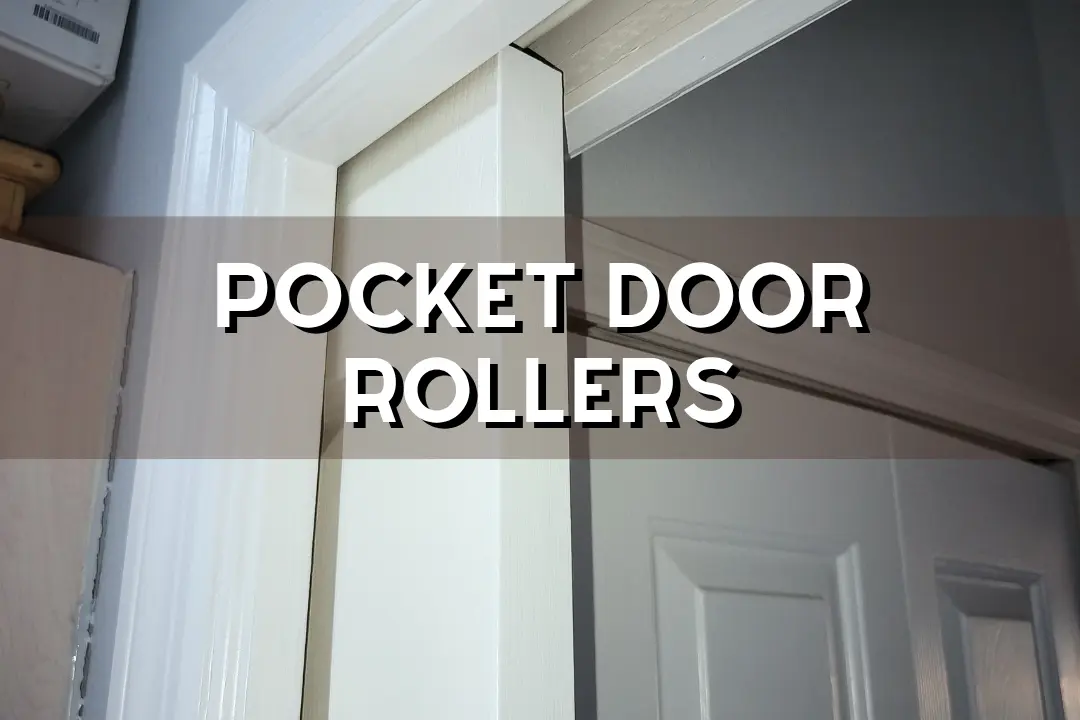
Is your pocket door sticking or making noise when it moves? A worn pocket door roller is often the cause. This guide shows five top picks for dependable pocket door rollers, how to measure your track, and easy steps for replacement. Read on to get your door gliding again.
Looking for pocket door rollers that glide quietly and last for years? This guide explains what to buy, how to replace them, and which models perform best in 2025.
What Are Pocket Door Rollers?
Pocket door rollers are the small wheel assemblies that let a door slide into a wall cavity with smooth, quiet action; they sit on a track and carry the door’s weight while keeping it aligned.
Most homes use top-hanger systems because they keep the door plumb and reduce floor wear, while models vary by wheel size (3/4 in., 13/16 in., 1 in.) and load rating.
For a quick browse of common sizes and brackets, check retail listings for pocket door rollers, then match specs to your opening and pocket door thickness for a clean fit.
Essential Components for Smooth Operation
Each roller set combines a wheel, bearings, a hanger bracket, and an adjustment screw, and those parts control noise, alignment, and travel distance.
- Wheels: 3/4–1 inch are common; larger wheels roll easier over minor track flaws.
- Bearings: Sealed ball bearings reduce friction and cut noise.
- Brackets: Steel or zinc parts resist flex and keep the door stable.
- Adjustment: Fine height screws center the door in the pocket.
- Stops/Guides: Floor or jamb guides stop sway and protect edges.
Types of Sliding Door Rollers
Ball-bearing rollers suit most homes because they roll with low friction and handle daily use without sticking.
Nylon or Acetal tires run quieter and protect the track, while steel wheels favor high loads and tough environments.
Twin bogie or quad assemblies spread weight across more wheels, which boosts stability on heavier doors and reduces wear in busy areas.
Key Features to Consider
Pick rollers by matching door weight, wheel diameter, and bracket style to your track; this avoids scraping, sticking, and premature wear.
Load Capacity and Door Weight
Weigh the slab or check the manufacturer spec, then choose rollers that exceed that figure by a safe margin for reliable support.
Light hollow-core doors often use 3/4–13/16 in. wheels, while solid wood or glass panels need higher ratings like 200–220 lb with ball bearings.
Material Quality and Durability
Steel brackets paired with nylon or Acetal tires give a strong and quiet mix, and sealed bearings keep grit out for a longer service life.
Zinc finishes resist corrosion in humid rooms, while convex wheel profiles help prevent binding and keep the door centered on the rail.
Compatibility with Existing Hardware
Match wheel diameter and hanger style to your track family (e.g., Johnson 111/100) and confirm door thickness clearance to avoid misalignment; see this practical guide on choosing the right pocket door track and rollers for sizing tips.
| What to check | Typical spec | Why it matters |
|---|---|---|
| Wheel diameter | 3/4″, 13/16″, 1″ | Correct size prevents derail and binding. |
| Door thickness | 1″–1-3/4″ | Fits pocket without rubbing guides. |
| Track profile | Johnson 111/100, universal | Hanger fit and stop location must match. |
| Capacity per pair | 150–220 lb+ | Handles weight with margin for longevity. |
| Adjustability | Height screw, slot | Fine-tunes reveal and latch alignment. |
If you’re upgrading an older frame, consider universal hangers that accept multiple wheel sizes, then pair with compatible pocket door hardware to complete the rebuild.
Top 5 Pocket Door Rollers for 2025
These picks cover common door weights, popular track profiles, and noise control needs across homes and RVs.
1. Prime-Line Twin Top-Mount Pocket Door Rollers
This twin-wheel set runs quietly on precision bearings, uses durable steel brackets, and fits standard pockets for a quick swap; buy a twin-pack to refresh both hangers at once for even wear.
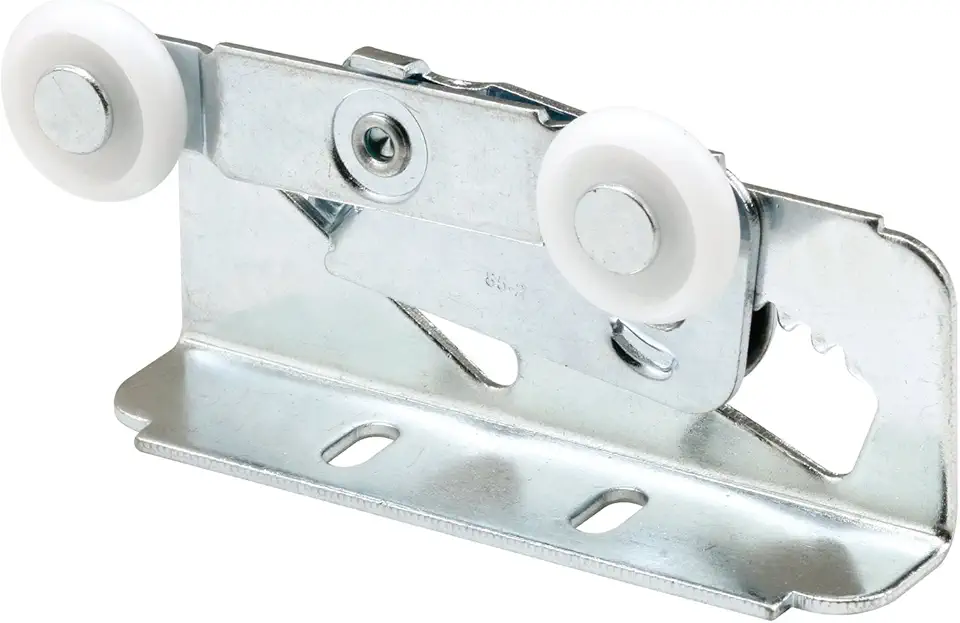
Prime-Line Twin Top-Mount Pocket Door Rollers (2-Pack)
- Smooth, quiet operation with precision bearings
- top-mount design for easy installation
- durable steel brackets resist wear
- twin-pack for replacing both rollers at once
- fits standard pocket door setups
2. 3/4 Inch Top Hanger Replacement Rollers
Use these for common 3/4 in. tracks and Johnson-style hangers; ball bearings cut friction for a smooth, quiet glide in light to mid-weight doors.
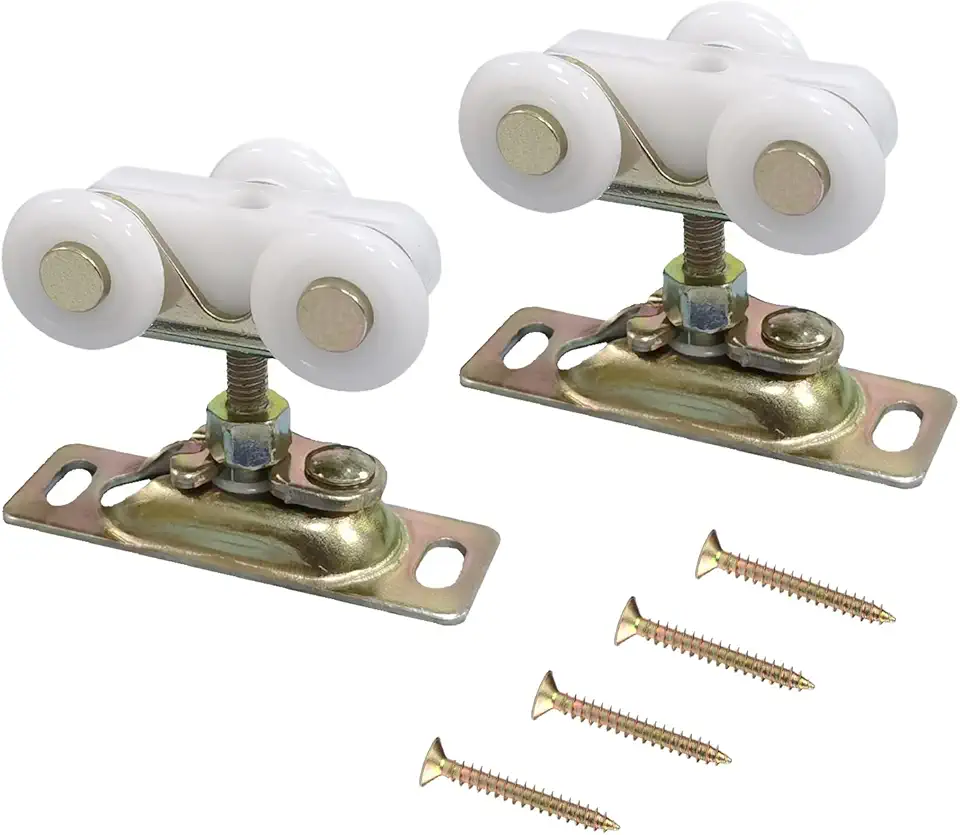
3/4 Inch Sliding Pocket Door Rollers — Top Hanger Replacement
- Ball-bearing wheels for smooth, low-friction sliding
- top-hanger design fits Johnson-style hardware
- 3/4 inch wheels fit common tracks
- straightforward swap-in replacement
- built for lasting performance and noise reduction
3. Prime-Line 13/16 Inch Convex Roller
A convex profile reduces binding on imperfect tracks, while the plastic tire protects the rail and the steel bracket adds strength for daily use.

Prime-Line 13/16 Inch Convex Pocket Door Roller (Single)
- Convex wheel profile prevents binding and keeps doors aligned
- plastic tire protects track surfaces
- steel bracket with ball bearings for smooth movement
- single-pack for targeted repairs
- quick, tool-light installation
4. Heavy-Duty 1 Inch Ball-Bearing Rollers
Rated up to 220 lb, these 1 in. rollers fit many standard tracks and are a smart pick for solid-core or wide doors needing extra capacity.

1 Inch Ball-Bearing Pocket Door Rollers — 2-Pack, 220 lb Capacity
- Supports up to 220 lb for heavier doors
- ball bearings ensure effortless gliding
- 1 inch wheels fit most standard tracks
- top-hanger assembly for easy mounting
- sturdy construction for long service life
5. RV Quad Roller Hangers
Quad wheels boost stability in mobile spaces and match popular Johnson tracks, making these ideal for RVs where vibration and noise are concerns.
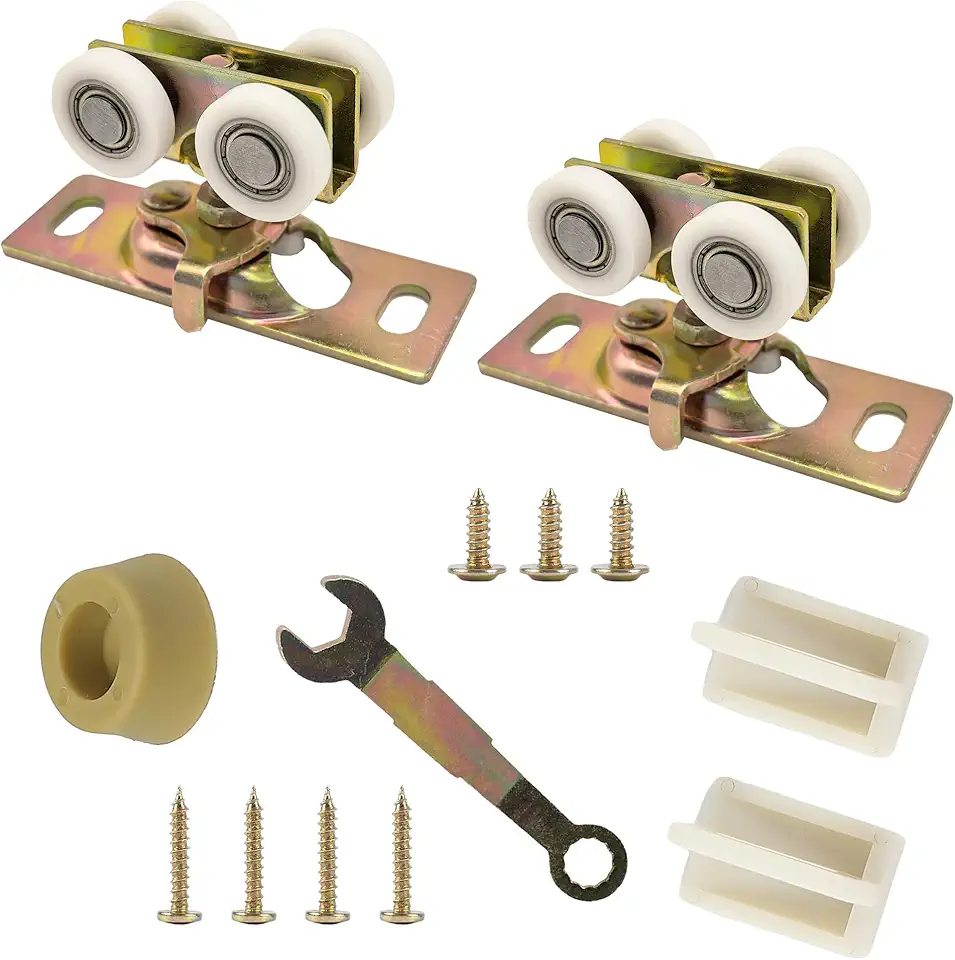
RV Quad Roller Hangers — 2-Pack, Fits Johnson Tracks
- Upgraded quad rollers for extra stability and smooth travel
- compatible with Johnson part numbers and 111/118F series tracks
- designed for minimum 1 Inch thick doors
- precise 13/16 Inch center-to-center fit
- ball bearings reduce noise in RV environments
Pocket Door Rollers Replacement Guide
Measuring for New Rollers
Before ordering, check wheel diameter, bracket style, and the track profile, then confirm door thickness to avoid rubbing.
- Measure wheel diameter on your old roller: 3/4″, 13/16″, or 1″.
- Photograph the hanger and track end for bracket identification.
- Weigh the door or estimate from the door spec sheet.
- Check pocket clearance and floor guide width.
- Match to the correct capacity and track family (e.g., Johnson 111).
Installation Tips and Best Practices
Remove the door, replace both rollers together for even wear, and adjust the height screws to square the reveal and latch cleanly; this step-by-step video tutorial shows hanger changes on a typical pocket frame.
After hanging, slide the door fully open and closed, tweak both sides in small turns, and test the latch strike before reinstalling trims.
Compatibility Considerations
Stick with the same wheel size and hanger type as your original set for a fast swap, or choose universal hangers that fit your track slot and stop blocks if the exact model isn’t available.
Maintenance for Long-Lasting Performance
Regular Cleaning and Lubrication
Vacuum the track, wipe with a lint-free cloth, and apply a light dry lube to the rail and bearings every 3–6 months for quiet travel.
Periodic cleaning and correct wheel selection reduce friction, noise, and costly hardware wear.
Which rollers to use?
Avoid greasy sprays that attract dust; pick silicone or PTFE formulas approved for your hardware and climate.
Signs Your Rollers Need Replacement
Watch for scraping sounds, door sway, chipped tires, flat spots, or uneven reveals, all of which point to worn wheels or loose hangers.
Extending Roller Lifespan
Keep the track clean, avoid slamming, use soft-close stops where possible, and verify floor guides are straight to cut side-loads on the wheels.
Pocket Door Track and Rollers Compatibility
Johnson Hardware Systems
Johnson 111/100 series tracks are common in North America, and many aftermarket rollers quote wheel diameter and hanger spacing to fit those profiles without frame changes.
Universal vs. Brand-Specific Options
Universal hangers help with older frames and rentals, while brand-matched parts protect warranties and often give the best alignment out of the box.
Common Sizing Standards
Most homes use 3/4″, 13/16″, or 1″ wheels, with door slabs from 1″ to 1-3/4″; verify your track slot width and hanger hole spacing for a clean fit and easy install.
If you want more project ideas, browse our home improvement blog for practical pocket-door tips and hardware picks.
FAQs
How do you replace pocket door rollers?
To replace pocket door rollers, remove any trim and take the door off the track (get a helper to support the door). Inspect the hanger and roller assembly, unbolt or unscrew the old rollers, install the matching replacement rollers into the hanger brackets, rehang the door, then adjust the roller height and alignment so the door runs smoothly before reinstalling trim. Have a screwdriver, wrench or socket set, and possibly a pry bar handy, and match the new rollers to the existing mounting and weight capacity.
What are the best pocket door rollers?
The best pocket door rollers combine durable materials and sealed bearings: nylon or Delrin rollers with stainless or plated steel hardware are quiet and long-lasting, while ball-bearing metal rollers carry heavier doors. Look for adjustable hangers, sealed bearings to keep out dust, corrosion-resistant finishes, and a clear weight rating. Reputable brands include Johnson Hardware, Stanley/National Hardware, and specialty pocket-door manufacturers, but choose based on your door weight, mounting type, and whether you want nylon for quiet performance or metal bearings for heavy loads.
How do you adjust pocket door rollers?
Most pocket door rollers are adjusted with a screw or bolt on the top of the hanger: lift the small cover plate if present, turn the adjustment screw or hex bolt to raise or lower the door until the gap and alignment look correct, and then tighten any locking screws. Make small adjustments, test by sliding the door, and repeat until it moves smoothly and closes flush without rubbing. If there’s no visible adjuster, the roller assembly may need loosening and repositioning in the hanger.
Why is my pocket door roller sticking?
A sticking pocket door roller can be caused by debris or paint buildup in the track, worn or flattened rollers, damaged bearings, a bent or dirty track, misalignment, or loose/loosing mounting hardware. Inspect the track and rollers, clean out dirt and old lubricant, straighten or replace a damaged track or rollers, tighten hardware, and adjust the hanger height. Replace the roller assembly if bearings are failing or the roller is visibly damaged.
Can pocket door rollers be lubricated?
Yes — many pocket door rollers benefit from lubrication, but choose the right product: use a dry silicone spray or a light silicone-based lubricant for nylon rollers and a white lithium or light machine oil for metal roller bearings. Avoid heavy grease that attracts dirt inside the pocket. Apply sparingly to the wheel surface and track, wipe away excess, and test the door; if bearings are sealed or damaged, replacement may be a better option.

Abdelbarie Elkhaddar
Glamorwood Ltd.
A door expert and home improvement writer with over 12 years of experience. I help homeowners and contractors choose smart, stylish, and secure doors.
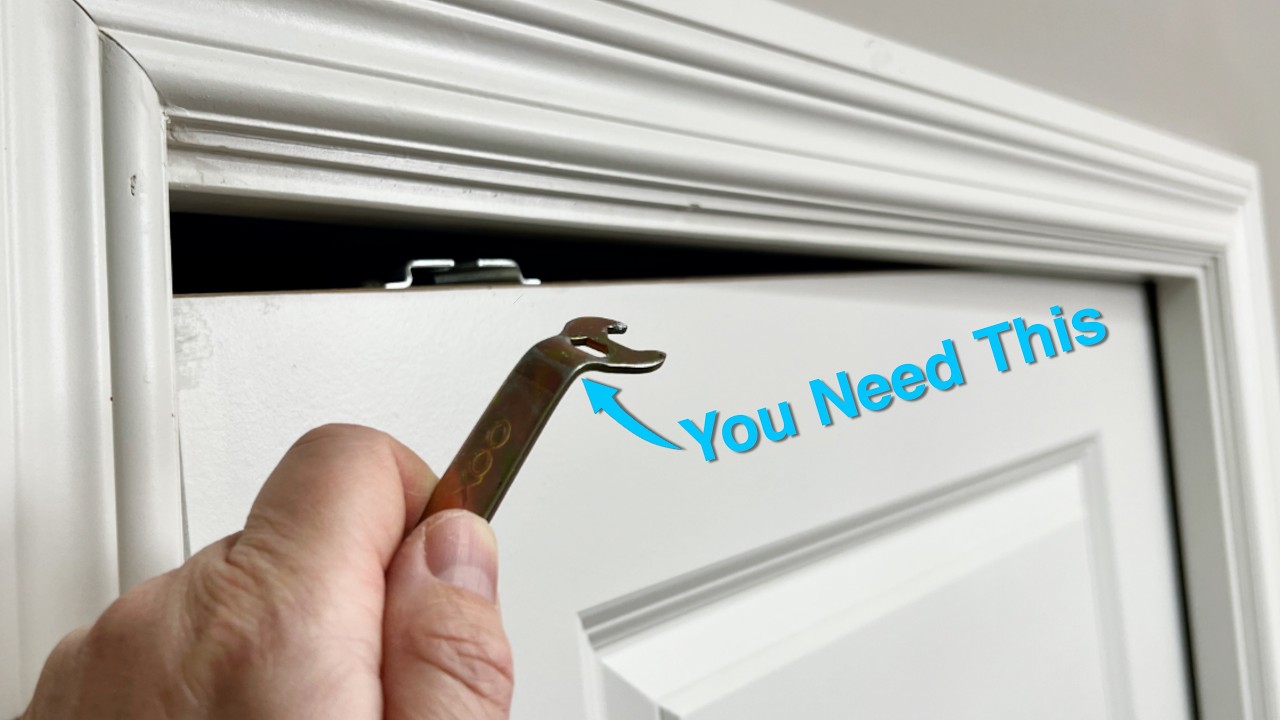






Leave a Reply